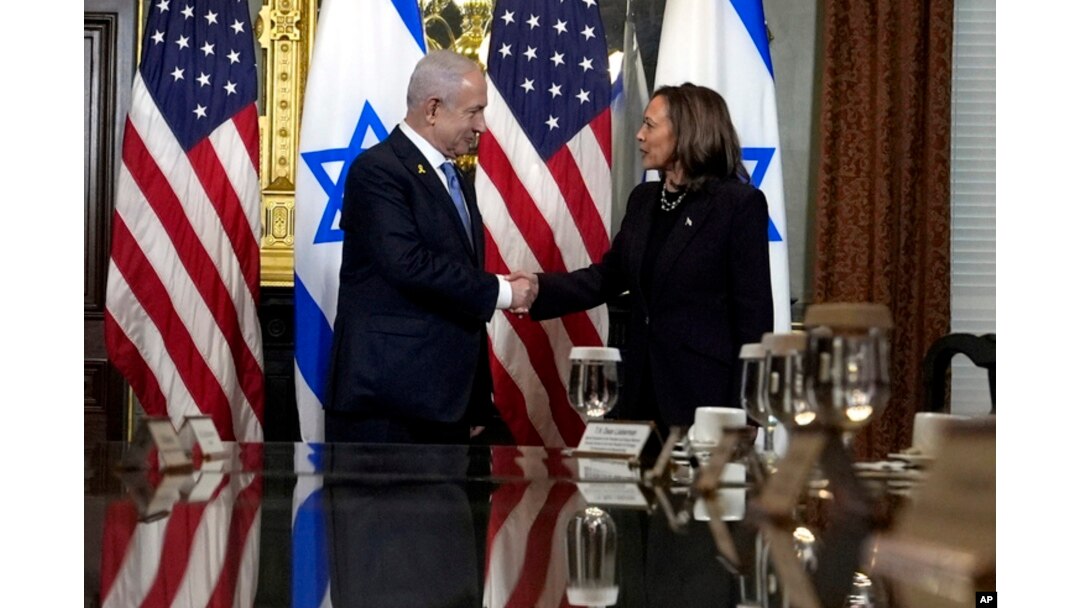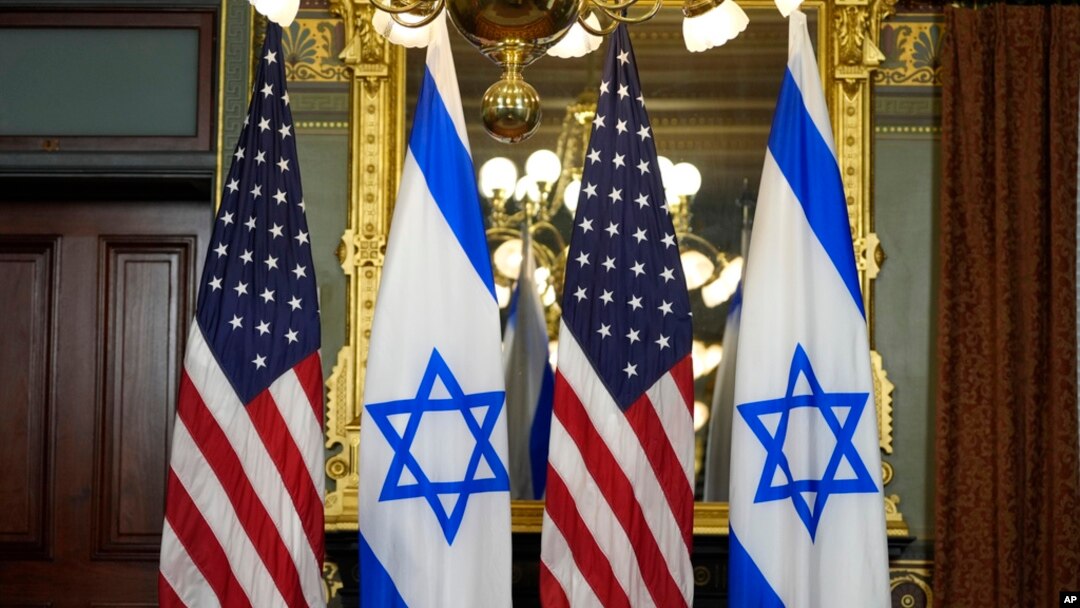Likely U.S. election rivals Vice President Kamala Harris and former President Donald Trump offered competing views on Israel’s conduct in its war in Gaza, as they separately met with Prime Minister Benjamin Netanyahu this week.
While reiterating support for Israel’s right to self-defense “from Iran and Iran-backed militias,” and condemning Hamas as a “brutal terrorist organization,” Harris delivered a forceful call to immediately reach a cease-fire.
“As I just told Prime Minister Netanyahu, it is time to get this deal done,” Harris said Thursday during remarks that followed a photo opportunity with Netanyahu where she appeared polite but firm and businesslike.
Reiterating her commitment to a two-state solution, Harris projected an empathetic tone on “the scale of human suffering” of the Palestinian people.
“What has happened in Gaza over the past nine months is devastating — the images of dead children and desperate, hungry people fleeing for safety, sometimes displaced for the second, third or fourth time,” she said.
“We cannot look away in the face of these tragedies. We cannot allow ourselves to become numb to the suffering. And I will not be silent,” Harris vowed.

Vice President Kamala Harris shakes hands with Israeli Prime Minister Benjamin Netanyahu before a meeting at the Eisenhower Executive Office Building on the White House complex in Washington, July 25, 2024.
In an apparent nod to the large swath of Democratic voters who are angry at the Biden administration’s staunch support for Israel’s military campaign, Harris said, “I see you and I hear you,” while appealing to the American people to “acknowledge the complexity, the nuance and the history of the region.”
Her grave and measured remarks stand in stark contrast to ad-libbed comments from Trump, who blamed the Biden administration for the turmoil in the Middle East and baselessly claimed that he would quickly resolve the Gaza conflict if elected.
“If we win, it’ll be very simple. It’s all going to work out and very quickly,” Trump told reporters gathered at his Florida residence Friday as he began his meeting with Netanyahu.
“If we don’t, you’re going to end up with major wars in the Middle East and maybe a third world war. You are closer to a third world war right now than at any time since the Second World War,” he said. “You’ve never been so close, because we have incompetent people running our country.”
Saying that he was “very good to Israel, better than any president's ever been,” Trump highlighted pro-Israel policies during his first term, including brokering the Abraham Accords that normalized Israel’s diplomatic ties with some Arab neighbors, moving the U.S. Embassy to Jerusalem and recognizing the Israeli annexation of the Golan Heights.
Republican presidential nominee Donald Trump meets with Israeli Prime Minister Benjamin Netanyahu at his Mar-a-Lago estate, July 26, 2024, in Palm Beach, Fla.
Trump soured on Netanyahu in January 2021 after the Israeli leader congratulated Biden for winning the 2020 election, which the former president falsely insists he won. He has since repeatedly criticized Netanyahu publicly over the Gaza war.
On Friday, the two appeared to have mended their relationship, with Trump forcefully pulling the Israeli leader’s arm to hold his body close as he shook his hand.
Eager for cease-fire
Both Harris and Trump are eager for a cease-fire and impatient with Netanyahu’s prosecution of the war, but for sharply different reasons.
“Harris wants Netanyahu to prioritize the humanitarian crisis and minimize civilian casualties. Trump wants Israel to win decisively — and quickly— before he takes office,” said Laura Blumenfeld, Middle East analyst at the Johns Hopkins School for Advanced International Studies.
Harris sees it as a “moral issue,” she told VOA, while Trump views it as a “mess.”
Warning: This video includes graphic images that some may find disturbing. Viewer discretion is advised.
Your browser doesn’t support HTML5
Harris urges Netanyahu to end Gaza war; Trump says he’ll solve it if elected
Eager to win back progressive and young voters, as well as Muslim and Arab American voters angry at the Biden administration’s policy on Gaza, Harris may strive for a more balanced approach.
“Harris’s approach to Gaza would embrace the gray ‘complexity’ of the Middle East, in contrast with Biden’s, which was characterized by a bright clarity that at times could be interpreted as blinding,” Blumenfeld said. Their approaches may differ more in style than in substance, but “managing emotions among the traumatized parties in the Middle East can make or break a peace agreement.”
Polls show more Americans opposing than supporting Israel’s military action in Gaza, particularly Democrats. In the more than 290 days since the October 7 Hamas attack that killed roughly 1,200 Israelis, Israel’s military response has killed more than 39,000 people, mostly civilians, according to the Hamas-run Gaza health authority. In May, Israel estimated the toll at 30,000.
Still, whoever wins the November election, a new administration in Washington could bring some shift in U.S.-Israel relations, whether or not Netanyahu stays in power, said Aaron David Miller, a former U.S. negotiator for the Middle East who is now with the Carnegie Endowment for International Peace.
“Whoever is prime minister is going to have to deal with, on one hand perhaps a more critical Democratic approach under Kamala Harris, and an unpredictable one under President Trump,” he told VOA.
While a second Trump administration would be “definitely supportive” of Israel, Miller said the notoriously transactional Trump “instrumentalizes his relations.”
“When people are useful to him, he praises them, and when they're not, he can easily abandon them,” he said. “He's very, very unpredictable.”


